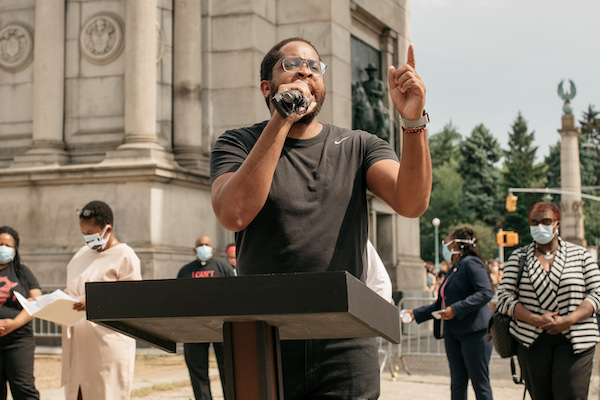
DOWNTOWN BROOKLYN — Depending on who you ask, the Clean Slate Act is either a good way to give formerly incarcerated people a fresh start in life — or a bad idea that protects criminals at the expense of law-abiding citizens.
The bill, which was passed by the New York State Legislature on June 9, would automatically seal the criminal records of the formerly incarcerated from public view.
For example, an employer hiring a worker would not be able to find out if that individual has a criminal record. A landlord would be prevented from learning about a prospective tenant’s criminal history.
The New York State Catholic Conference, the public policy arm of the bishops of New York, has given the bill a cautious thumbs-up.
“The Catholic Church teaches forgiveness and redemption, and we’ve long been supportive of the concept of the Clean Slate Act,” the conference said in a statement.
Jerry Kassar, chairman of the New York State Conservative Party, is opposed to the Clean Slate Act. He called it a “pro-criminal bill” that will “deprive employers of the right to know who has a dangerous criminal record before hiring.”
The Clean Slate Act covers most misdemeanors and felonies, although records of individuals who served time for certain Class-A felonies — like murder, kidnapping, and sex crimes — would not be sealed. And criminal records would not be shielded from law enforcement.
Gov. Kathy Hochul has not yet signed the bill into law. The bill’s sponsors estimate that 2 million people will be eligible.
Under provisions of the bill, the records wouldn’t be sealed right away. There would be a required waiting period following release from prison to ensure that the formerly incarcerated person stays out of trouble. In the case of a felony, the waiting period will be eight years. For misdemeanors, it will be three years.
Before the bill was passed, however, the Catholic Conference expressed concern over how the new law would affect the ability of dioceses to conduct a proper vetting of prospective employees who will work with children and vulnerable populations.
But after discussions with the bill’s sponsors — state Sen. Zellnor Myrie of Brooklyn and Assemblywoman Catalina Cruz of Queens — and with Hochul’s office, the Catholic Conference came away satisfied that its concerns had been addressed.
The bill would allow access to records to entities that are required to conduct fingerprint-based background checks on prospective employees who will be working with children.
“We will vigilantly monitor the law’s implementation to ensure that children in our care will remain protected, while those who have paid their debt to society receive a fresh start,” the conference said.
Here’s How Clean Slate Act Would Work
Criminals records would be sealed for:
- Misdemeanors after a waiting period of 3 years following completion of sentence
- Most felonies after an 8-year waiting period
Cases in which records would not be sealed:
- Murder
- Sex crimes
- Kidnapping
- Arson
- Certain felony drug convictions
Other exceptions:
- Department of Motor Vehicles would have access to records of driving-related convictions
- Agencies that process firearm license applications would maintain access
